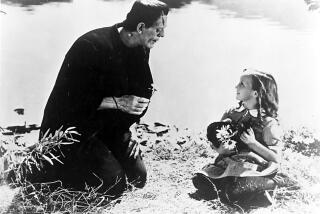Book review: âLove Childâ
Love Child
A Novel
Sheila Kohler
Penguin: 256 pp., $15 paper
Longtime novelist Sheila Kohler had a breakthrough popular hit with 2009âs âBecoming Jane Eyre,â in which she imagined her way into the life of beloved gothic novelist Charlotte BrontĂŤ. âLove Child,â her first novel since, takes place half a world away, yet seeds of the gothic lie at its core.
Set in early 20th century South Africa, âLove Childâ is a slight family drama centered on a beautiful, headstrong woman who calls herself Bill. In alternating chapters, we see Bill in the 1920s and â30s, young and brash, and in the 1950s, recently widowed. Her husband has left her an ample fortune, and the book opens with an advisor telling Bill that she must make her own will.
Discovering whom she will leave her money to is the juiciest of three mysteries intertwined in the novel. At 48, Bill is vain and flighty, emotional, lonely, sometimes generous, sometimes childish. She considers a parade of hopefuls: her freeloading sisters and brother, a distant semi-nephew, two servants, her two sons. Her hopes for closeness with her sons are dashed when she visits them at their boarding school; she finds them overly pious, intellectual and scornful. She tells herself theyâve been adequately taken care of by their father.
Who is that father? Although his name is not revealed for 100 pages, this mystery is less successful, because her relationship with the only candidate we know is so clearly doomed. In the 1920s, the 17-year-old Bill fell for and eloped with Isaac, a coworker of her fatherâs in the diamond industry. Unfortunately, Isaac was Jewish and she was not; they were found out by her parents and almost immediately torn apart.
Almost. They spent one night together. The book is called âLove Childâ for a reason.
Of course, Bill became pregnant, and she was cared for by three maiden aunts with whom she and Isaac had sought shelter. Here is where one of Kohlerâs gothic touches comes in: Despite the jacarandas and the wide African sky, Bill is frightened, a prisoner in their dark home. What will happen with that pregnancy â apart from what the title makes obvious â is not revealed until the bookâs final pages.
The third mystery is how Bill came to be married to a rich man. This thread is picked up with her, at age 27, marginally employed and living at home. She answers a newspaper ad to be a rich womanâs companion, with the help of her siblings. âShe made her exit, slipping out of the door in her borrowed clothes, as Charles gave her a kiss and wished her luck at the door,â Kohler writes.
If that sentence rings with a clunking redundancy to you, the flat prose of this novel will swiftly prove unsatisfying.
Billâs new employers are Helen and Mark: She lives in the house and serves as Helenâs companion, making sure the older, sometimes absentminded woman stays safe â particularly from alcohol. Mark, busy working, is sometimes kind, sometimes authoritarian, sometimes overly attentive to Bill. The gothic creeps in again: Eventually, the power shifts in this close-knit triangle, and a favorable marriage awaits Bill.
In the 1950s chapters, Bill is drinking too much, relying on the prickly companionship of her mixed-race maid and Zulu cook. By this time, South Africaâs apartheid system has been institutionalized, but the brutal disenfranchisement of the countryâs black citizens is nearly absent from this book. Bill remains blithely ignorant of politics, considering nothing about her servantsâ lives except how they fill her needs: She is saddened that the cook likes her sons more than he likes her. Her maid is illiterate, noble and faithful â a wincingly retro character â and holds the key to Billâs long-kept secret.
Richly imagined historical novels can be deeply satisfying, but âLove Childâ uses its time and place as little more than a painted backdrop. And despite its clever structure and gothic flair, it is hobbled by stock characters and repetitive prose. If I were heading to the beach, Iâd find another book to hold down the corner of my towel.
More to Read
Sign up for our Book Club newsletter
Get the latest news, events and more from the Los Angeles Times Book Club, and help us get L.A. reading and talking.
You may occasionally receive promotional content from the Los Angeles Times.








